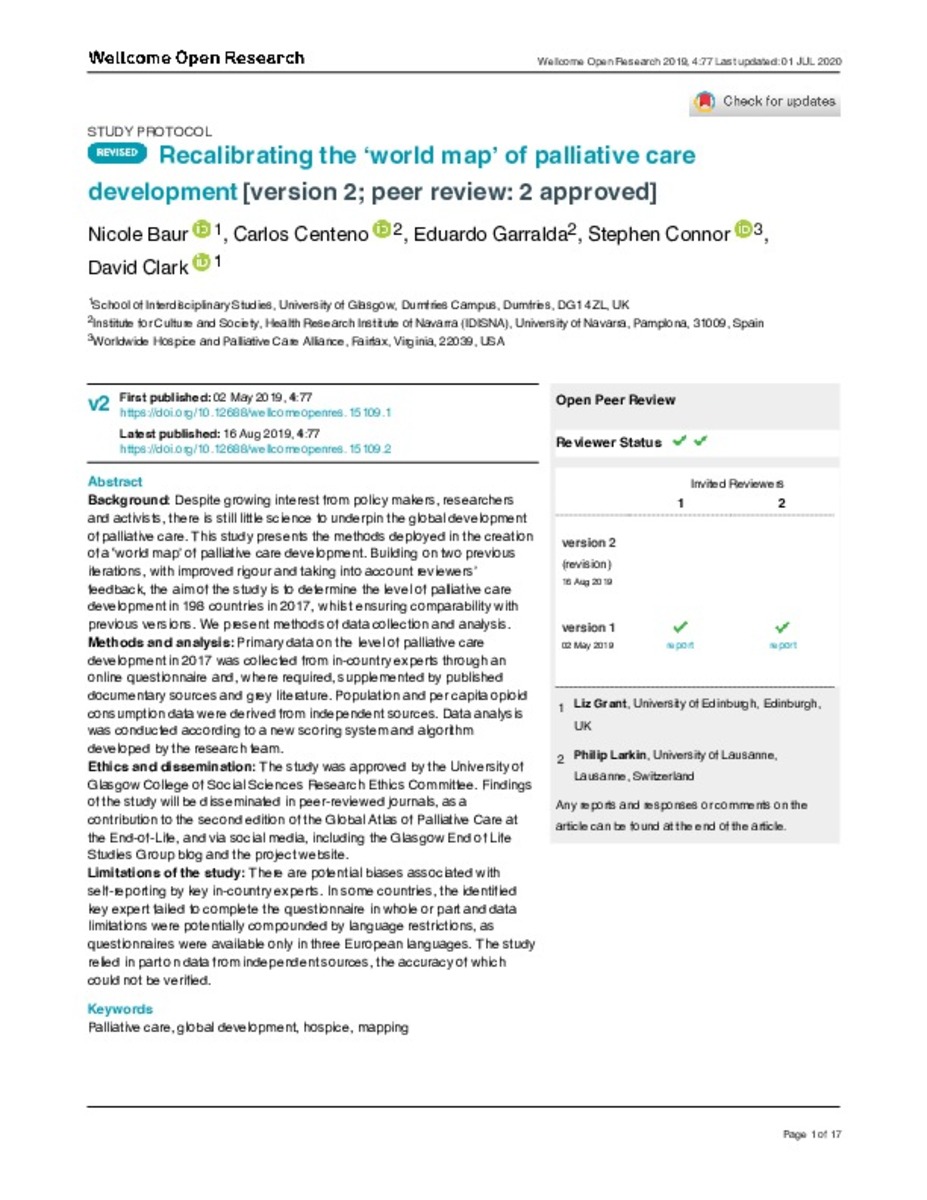Full metadata record
| DC Field | Value | Language |
|---|---|---|
| dc.creator | Baur, N. (Nicole) | - |
| dc.creator | Centeno, C. (Carlos) | - |
| dc.creator | Garralda, E. (Eduardo) | - |
| dc.creator | Connor, S. (Stephen) | - |
| dc.creator | Clark, D. (David) | - |
| dc.date.accessioned | 2020-07-31T09:29:16Z | - |
| dc.date.available | 2020-07-31T09:29:16Z | - |
| dc.date.issued | 2019 | - |
| dc.identifier.citation | Baur N, Centeno C, Garralda E et al. Recalibrating the ‘world map’ of palliative care development [version 2; peer review: 2 approved] Wellcome Open Research 2019, 4:77 | es_ES |
| dc.identifier.issn | 2398-502X | - |
| dc.identifier.uri | https://hdl.handle.net/10171/59139 | - |
| dc.description.abstract | Background: Despite growing interest from policy makers, researchers and activists, there is still little science to underpin the global development of palliative care. This study presents the methods deployed in the creation of a ‘world map’ of palliative care development. Building on two previous iterations, with improved rigour and taking into account reviewers’ feedback, the aim of the study is to determine the level of palliative care development in 198 countries in 2017, whilst ensuring comparability with previous versions. We present methods of data collection and analysis. Methods and analysis: Primary data on the level of palliative care development in 2017 was collected from in-country experts through an online questionnaire and, where required, supplemented by published documentary sources and grey literature. Population and per capita opioid consumption data were derived from independent sources. Data analysis was conducted according to a new scoring system and algorithm developed by the research team. Ethics and dissemination: The study was approved by the University of Glasgow College of Social Sciences Research Ethics Committee. Findings of the study will be disseminated in peer-reviewed journals, as a contribution to the second edition of the Global Atlas of Palliative Care at the End-of-Life, and via social media, including the Glasgow End of Life Studies Group blog and the project website. Limitations of the study: There are potential biases associated with self-reporting by key in-country experts. In some countries, the identified key expert failed to complete the questionnaire in whole or part and data limitations were potentially compounded by language restrictions, as questionnaires were available only in three European languages. The study relied in part on data from independent sources, the accuracy of which could not be verified. | es_ES |
| dc.description.sponsorship | This work was supported by the Wellcome Trust [103319], a Wellcome Trust Investigator Award to DC | - |
| dc.language.iso | eng | es_ES |
| dc.publisher | F1000Research | es_ES |
| dc.relation | info:eu-repo/grantAgreement/WT/Medical Humanities/103319 | - |
| dc.rights | info:eu-repo/semantics/openAccess | es_ES |
| dc.subject | Palliative care | es_ES |
| dc.subject | Global development | es_ES |
| dc.subject | Hospice | es_ES |
| dc.subject | Mapping | es_ES |
| dc.title | Recalibrating the ‘world map’ of palliative care development | es_ES |
| dc.type | info:eu-repo/semantics/article | es_ES |
| dc.editorial.note | This is an open access article distributed under the terms of the Creative Commons Attribution License, which permits unrestricted use, distribution, and reproduction in any medium, provided the original work is properly cited. | es_ES |
| dc.identifier.doi | https://doi.org/10.12688/wellcomeopenres.15109.2 | es_ES |
| dadun.citation.endingPage | 17 | es_ES |
| dadun.citation.publicationName | Welcome Open Research | es_ES |
| dadun.citation.startingPage | 1 | es_ES |
Files in This Item:
Statistics and impact
Items in Dadun are protected by copyright, with all rights reserved, unless otherwise indicated.






